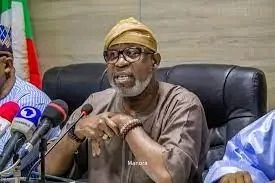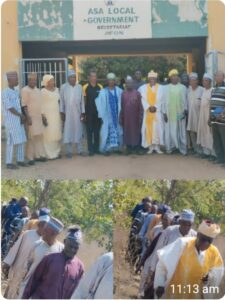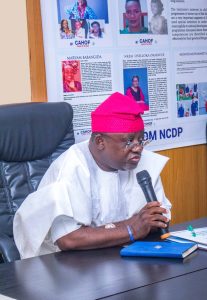DEMOCRACY, DEVELOPMENT, AND NATIONAL SECURITY BY MAJOR GENERAL KAMOURDEEN ABIODUN ROLE (RTD)

The global environment today is filled with various complexities thatnations are routinely finding themselves in development and governance issues.It is also engaged with consternations that many are confronted with one securitychallenge or the other. Halfway through the years of the last century, mostnations of the world were influenced and divided by the Western and Easternmodel of governance based on social, political, and economic ideologies. Whilethe West embraced a political process that encouraged capitalism, the Eastpractised socialism and China, in her unique identity, pursued the ideology ofCommunism. All these ideologies were directed at ensuring economicdevelopment and political governance. The implementation of these politicalpursuits and the desire to have global influence by the various divides broughtabout international conflicts that witnessed global security challenges thattransmuted to World Wars and Cold Wars and has still not abated as we arewitnessing in Ukraine today..
Although national security challenges are burdens that nations mustconfront, it is when they transform into violence or destructions, which hinderpeaceful political co-existence, social harmony, economic growth, and nationalpeace and security that they become litmus tests of the capacity of a country’sgovernment to meet those challenges with minimal deprivation to the citizens.
Most scholars of western incline believe democracy forms the basis fordevelopment and national security. In Razu’s (2008) opinion, democracy,development and national security are interdependent and occupy importantspace in the socio-economic, politico-religious-cultural sphere of a nation.
It further elucidates that for any society to function efficiently and effectively, thesefactors must play significant and crucial roles as they reflect human yearningsand aspirations.
Nigeria is not immune from the global political and developmentchallenges, and she has had shares of civil war and internal disruptions too. Herdemocracy has evolved over the last two decades and the terrain has been markedby undulating political journey. Although the period has staved off militaryinterest in politics, it has witnessed uncertainties and upheavals, which haveprevented expected development, and it has also opened avenues of threats tonational security including terrorism and violent extremism.
The security of the nation impacts on all frontiers of development and today the level of insecurity inNigeria has hindered the expected social, economic and political advancement ofthe nation (Eseyin 2022).CONCEPTUAL CLARIFICATION. To address the topic of discussion effectively, the key terms would bedefined briefly. These are democracy, development and national security.a. Democracy. It was President Abraham Lincoln who first gave a simpledefinition of democracy in 1863 as” the government of the people, by the peopleand for the people.” Zakari (2016), however, posited that democracy is only anelectoral arrangement that allows citizens to vote and be voted for in other tomake political decisions. It is a system for choosing and replacing governments through free and fair elections, and a binding electoral process that translates popular view into public policy.
The fundamental features of democracy includegovernment based on majority rule and consent of the governed, the existence offree and fair elections, the protection of minority rights, respect for human rights,equality before the law, due process, and political pluralism (Dambazau 2022).2
For democracy to function, it must operate within the principles of a Constitutionwhich is considered the soul of a democratic society (Razu,2008). Democracy requires adherence to the rule of law by ensuring that civil liberties, politicalrights, equality and dignity of citizens are protected (Mangesh 2014).b. Development.
Development is essentially a concept that is synonymouswith economic development, measured in gross domestic product. It has,however, transformed beyond economic growth to include social dimensionssuch as literacy, distribution of income, life expectancy etc (Zakari 2016).Development is a process that creates growth, progress, and positive changes thatenable citizens to reach the highest level of their ability through unfetteredfreedom to actualize their potentials (Dambazau, 2022). While economic growthis necessary for combatting poverty, inequalities raise social and politicalconcerns. Therefore, equal access to food, clean water, education, health care,shelter, clothing are indices of development (Dogan & Ozluk 2016).b. National Security.
Security is the cornerstone of development andprogress in a free society, and it guarantees the well-being of the citizens.National Security is about how to protect the sovereignty, culture, unity andeconomic welfare of the State (Dogan & Osluk 2016). It is a state of reduced orcontained threats in which the stability of a nation is not in an imminent dangerof disruption from within and without (Nweke & Nwachukwu, 2014). Longley(2021) clarifies that national security is the ability of a country to control itsresources and provide total protection for its citizenry.
These include economic,political, energy, cybersecurity, human and environmental security. He positedfurther that implementing national security involves two levels: physical andpsychological. The physical is based on the capacity of the country to deteradversaries from aggression, including going to war, while the psychologicalrequires citizens’ willingness to support the government’s effort. Those3
conceptions hold that the State is the only institution with the primaryresponsibility and power for the safety of its territory and progress of its people(Zabadi, 2005).RELATIONSHIP BETWEEN DEMOCRACY, DEVELOPMENT ANDNATIONAL SECURITY6. Democracy and Development. The relationship between these conceptsis a complex one because they are so inter-dependent that they become moremeaningful only when they are woven positively with each other. It is alwayspresumed that democracy forms the basis for good governance, and it is oftentreated as synonymous with development (Razu, 2008). We often hold the notionthat once a nation embraces democracy the political and economic system wouldbe stable forever. The endless goals of democracy are economic growth,improvement in living standards and sustainable development. Although thereare strong opinions that democracy contributes to economic growth and enablesbetter socio-economic outcome, others submit that democracy is not an outcomeor consequence of development but a necessary ingredient of development(Zakaria, 2016).7.
The essence of this argument is hinged on the fact that though democracymay promote development, it is the key institutions in a democratic system thatupholds accountability, checks and balances. The development successes thatwere witnessed in some Asian countries was owing to their strong institutionalcapacity which demonstrated remarkable efficiency and resilience even duringpolitical crisis. In our environment, increased inequalities, socio-politicalinstabilities, weak institutions and poor governance often present negativeoutlook of democracy and development. Corruption within the state agenciesalso exacerbate the situation by blocking socio-economic advantages that benefitthe citizens.
Democracy and National Security. The core value of democracy isinherent in its promise to bring about peace and security in in the face of myriadsof socio-economic and political challenges. According to Dambazau, democracystrengthens the state by strengthening social capacities to manage threats tohuman security, and that democracy is not just about elections, but also as meansof enabling human rights, physical well-being, human development andmanaging conflicts. Although elections are veritable cause of political crisis, itremains the accepted process of democratic representation.9. Development and National Security. There is a symbiotic relationshipbetween development and security. There is no development without securityand there is no security without development. National security focuses more onhuman well-being and social progress through sustainable development. Whengovernment policies are directed at enhancing development they contribute tosecurity. Inequality in political, and economic situation in which the people donot have access to resources for their survival contribute to outbreak of conflictand these affect elements of development and economic growth (Karov2018).
The foregoing underscores the fact that there is an inverse relationship betweeninsecurity and development. The greater the insecurity, the lesser development.In an environment like ours with multiple internal violent crises, development isrelegated to the background, while we exhibit regress rather than progress. It isonly when national security improves that investment would be attracted andjobs could be created.5
IMPORT OF DEMOCRACY DEVELOPMENT AND NATIONALSECURITY ON NIGERIA10. Nigeria is a nation of multi-ethnic diversities, cultural and religiousdifferences. In its sixty-two years of independence of admixture of democraticand military governance, it has experienced various political, economic andsecurity challenges, which have retarded its development. Up till now thesesocio-political and economic problems have not abated as they have hadunpleasant economic, demographic and psychological impact on the citizens.The unstable state of the nation and the intractability of structural and resourcedistribution have created the terrain for violent crises. The major violent crisesthe country’s government has had to contend with in the last twenty-three yearsof return to democracy include the Niger Delta militancy, ethno-religious clashes,Boko Haram insurgency, kidnappings for ransom, herdsmen/farmers clashes,armed banditry and lately IPOB/the unknown gun men menace. In addition tothese are the economic and financial crimes that have also contributed to theweakening of the fabric of the country’s development. The seeming downturn thecountry has been experiencing in the past few years from a hitherto the strongesteconomy in Africa to one that has gone through multiple recession has broughtabout near neglect of its fulfilment of its social obligations to its citizens.Because of the pervasive violence and the seeming incapacity of the governmentto address it effectively, Nigeria now ranks 16 out of 179 countries on the FragileStates Index (2022) and 143 out of 163 on the Global Peace Index (2022).11. Chapter II of the Constitution of the Federal Republic 1999 (Amended)spells out government’s responsibilities to the Nigerian citizens which includedefence, preservation and promotion of democratic values and economic wellbeing of the people. In upholding this tenet of the Constitution, despite thechallenges that have constituted clogs in the wheel of democracy anddevelopment in the country, Nigeria has made some democratic progress over theyears as it has conducted regular elections that have created incentives forpolitical participation by the citizens. In the next two months, Nigerians would beout there again to exercise their democratic rights to choose political leaders andthe government that would direct the affairs the country for the next four years.12. Furthermore, the National Security Strategy (NSS) provides that theGovernment of Nigeria is committed to protecting its people, economic interests,infrastructure, and way of life and will deploy the full spectrum of nationalpower to ensure a safe and secure nation. This is an assurance that thegovernment is committed to promoting security and development by ensuringthat the people have access to opportunities for empowerment andself-actualization through social investment that protects the poor and guaranteesequitable distribution of wealth. An element of national power which thegovernment has deployed to underscore its commitment is the armed forces andother security agencies to curb the insurgency in the North East, armed banditryin the North Central and North West, protection of the oil installations in theSouth South, restraint of separatist agitation in the South East and South West ofthe country to ensure safe and secure environment for the pursuit of nationalpeace, personal well-being, prosperity and development.13. For Nigeria to optimise the tripod of democracy, development andnational security for her peace, progress, and prosperity, it must have awell-functioning government that will ensure equitable distribution of resourcesand create a good investment environment that will guarantee human rights anduphold low level of corruption (Jega, 2022). Development entails responsiblegovernance, people’s empowerment, social cohesion, and ecological integrity
(Alli, 2022). The government must develop political capacities that will beinclusive and transparent through unbiased regulatory agencies and oversights,and by incorporating civil society actors, professionals and resourcefulorganisations to elevate the technical strength in governance.
In conclusion, I would like to quote Immanuel Kant who avers that“societies that are governed by democratic values are more inclined to avoidviolence and armed conflict”. This assertion underscores the fact that in anycountry where democracy and development are assured, peoples’ livingconditions are improved as redistribution of wealth reduces poverty and thesocio-political, cultural and economic norms are promoted. This in effect meansdemocracy and development depend on the commitment and capacity of thegovernment of the day to ensure positive outcome. Government has the greatestdirect influence on national development and security, and it must lead increating the conducive atmosphere and environment to encourage accountabilityand transparency, economic investments, equal rights, social cohesion, access tobetter education, health care, infrastructure, and developing a technological basefor advancement. If these democratic values are imbibed and pursued, it isbelieved, would ensure sustainable development and relative security againstcrime and extreme

GENERAL ROLE DELIVERED THIS SPEECH AT THE YOUTHS MENTORING CLINIC ORGANISED BY THE INSTITUTE OF GOVERNANCE AND LEADERSHIP STUDIES IN AFRICA, IGLSA, ABUJA








